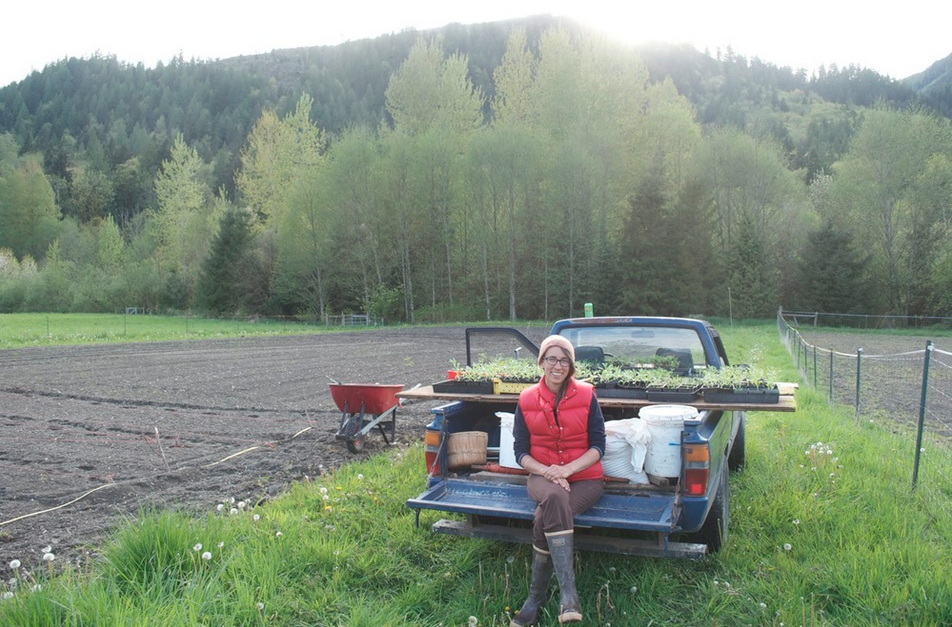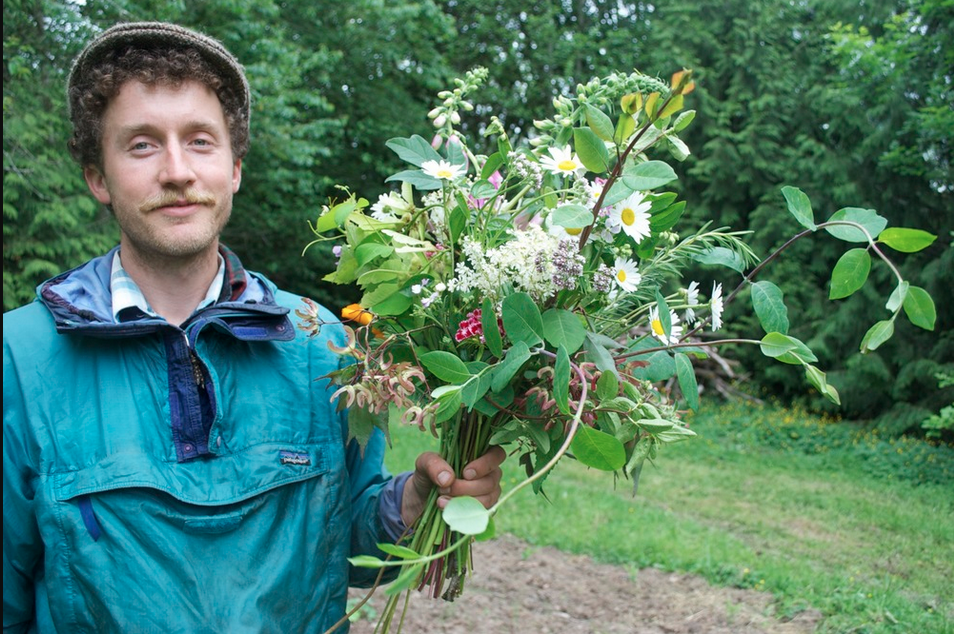
Peace and quiet enveloped me as I leaned against the doorframe of Sadie Beauregard and Paul D’Agnolo’s wooden yurt, one leg draped over the balcony’s edge, gazing down at the blueberry, raspberry, thimbleberry, and salmonberry bushes that the three of us had just harvested for the pie we would soon eat with their sweet neighbor Margot, a seventy year-old member of River Farm, an intentional community and cooperative farm located in Van Zandt, Washington. The two moved from farms on Bainbridge Island to the River Farm in December to begin a farm operation of their own, Foothills Flowers Farm—a far-off dream for so many.
Looking east from my perch in their elevated yurt, I took in a view of the Twin Sisters peaking over the forested foothills of the North Cascades, a beautiful backdrop to the resilient permaculture that the stewards of this Evergreen Land Trust have nurtured since a group of anarchists from Capitol Hill began the intentional community decades ago. Various walnut, apple, cherry, and plum trees provided shade for the rambunctious piglets romping around their grassy pasture. In the distance, the north fork of the Nooksack River carved along the property’s edge, encompassing the many small households, garden plots, pastures, trails, and groves within this Van Zandt paradise.
Seeking refuge from the early evening’s thick summer air, the three of us sat indoors, surrounded by textured bouquets of native flowers grown by the couple just a few hundred feet away, to be sold at various farmers markets. A John Prine record spun through the airwaves while we slow-cooked a blueberry and garlic scape-soaked salmon from the nearby rushing river, caught and gifted by a neighbor on the farm. This cooperative “what’s mine is yours” mentality is one of the many progressive concepts that drew Sadie and Paul into the sustainable farming community at various points in their life history.
The couple’s stories converged on Bainbridge Island while working for various farms and transformed into a shared desire to make the dream a reality: start a farming business, live sustainably, strengthen the farming community, and, ultimately, help to heal an ailing food system.

Paul, a Minnesotan, was turned off by his local farming community’s endless monocrop chemical agriculture that dominated the landscape, eventually farming on an island in Vermont’s Lake Champlain following a summer in Alaska. After an internship at Milwaulkee’s Growing Power, Paul traveled to California to work in the mountains looking for specific plants, eventually finding a home in Washington. Once in the Pacific Northwest, Paul wrote to his siblings in Minnesota, urging them to “quit their jobs, move west, buy a farm, climb mountains, catch fish, and be a family!” Within a year, the siblings were reunited, and five years later they continue to thrive. Paul expanded his farming experience, working at Seattle Tilth Farm Works in Auburn before eventually moving to the island to work with Symbiosis Food Cart and Bainbridge Island Farms, later moving to Butler Green. There, he met his “sweet Sadie beau” who has “been key in keeping [their] wandering way aligned with [their] hopes and aspirations toward owning a farm operation.”
Sweet Sadie, a moniker that so fully encompasses her tender nature, is a Vashon Island native who began this work five years ago after falling in love with farming during a year of urban gardening with AmeriCorps*VISTA in Seattle. After her service, Sadie took an internship at a small vegetable farm on San Juan Island, feeling like she “could farm forever.” She, like Paul, savors “the physical, hands-on nature of farming, as well as the opportunity to be outside and think creatively about growing, harvesting, and marketing.” Following her internship, Sadie was hired on at the island’s Persephone Farm where she “found flowers,” and flowers found her. There, she came to realize the importance and value of local flowers, seeing them akin to local food in that “conventional flowers are often grown with heavy chemicals by workers with poor working conditions and shipped hundreds of miles.” Eventually, her island farming career led her to work with both Heyday Farm and Butler Green, where she met Paul and found her best friend, a partner to build a farm with, to cook, hike, and laugh with “at all of the mistakes and triumphs we make along the way.”
With Paul’s brother operating Small Acres Farm nearby their now budding flower farm, Foothills Flowers, Paul and Sadie were able to partner their CSA operations for broader outreach. They have secured stands at the Fairhaven Farmer’s Market in Bellingham on Wednesdays, the Lynden market on Thursdays, and the Twin Sisters Market, which was created by fewer than ten local farms operated by young sustainable farmers, including Foothills Flowers.
This cooperative attitude is the tie that binds the farming community together. “We’re all broke, tired, struggling—but that’s what needs to change: the competitive attitude between farmers needs to turn into a cooperative one,” explained Paul. “The glimmers of light are where you and your buddies can help each other out—you can have a market where you don’t need to be there every week, or land you don’t need to own, and you can teach each other and share your secrets.”
Leaning against the open doorway across from me, Paul briefly paused, looking out across his garden. “Our food system is broken and we don’t have enough farmers to fix it.” This sharing of knowledge creates an important dialogue and helps strengthen community in a big way. Being at markets and conversing with your community about growing sustainably builds autonomy and excitement, and not just between farmers, causing everyone to care more about their natural surroundings.
Foothills Flowers Farm is built upon this appreciation and sense of place in life. The focus is on what bouquets do to you when you’re around them. “What I like about floriculture is that it really connects you to the season and makes you notice native plants with distinct flowers,” explained Paul, who described the bouquets produced by their farm as native flowers that are appropriate for climate and seasons, incorporating perennials, greenery, vines, and grasses to add texture. “They make you look at every plant and think, ‘How beautiful is that plant? Can we add that to a bouquet? Would we be able to make others see its beauty, too?’”
The answer is yes. Their unique and nontraditional flower arrangements are simple and breathtaking, featuring sweet pea, lupin, millet, wild rose, and thimbleberry blossoms, to name a few. Following a grant from the Bellingham Food Cooperative, which was used for marketing, supplies, insurance, and a rental truck arrangement with Cloud Mountain, another cooperative farm nearby, the two have taken Foothills Flowers to new, bold heights. Their success has stemmed from intense community support and the necessity for a healthier, stronger farming culture. Support your farmers, know your farmers—visit foothillsflowersfarm.com for more information about offers on events, weddings, and Sadie & Paul’s mission.
Contributed by Christine St. Pierre
July 2nd, 2015 at 1:10 pm
You’ve seen “Sweet Sadie” in our Blog before see http://parfittway.com/Blog/?p=499 and in our print edition http://harbourpub.com/PDFs/reporter_summer_2-2012.pdf Congratulations Sadie & Paul!
July 7th, 2015 at 10:49 pm
Great review Christine! Love them and all they stand for!!